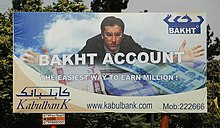New Kabul Bank
[3] In 2010, it was disclosed that its Chairman Sherkhan Farnood and other insiders were spending the bank's US$1 billion for their own personal lavish style living and lending money under the table to family, relatives and friends.[8] DAB stated in February 2011, it would seek to sell Kabul Bank within three years once it was rehabilitated,[9] but both the International Monetary Fund and US officials subsequently pressed for a rapid wind down of the institution.[19] On 27 December 2010, a suicide car bomber killed at least three Afghans, including one policeman, as he targeted police officers who lined up to withdraw their salaries in front of Kabul Bank in central Kandahar; the midday explosion also wounded 16 policemen and five civilians, officials said.[22] In early 2010, the Washington Post reported that the Kabul Bank played a part in "a crony capitalism that enriches politically connected insiders and dismays the Afghan populace.Afghan leaders promised to guarantee deposits in an attempt to arrest the panic, which began at the end of August 2010 when the country's top banking officials demanded the resignations of both Frozi and Farnood."[25] In October, the Washington Post reported that Mahmood Karzai could soon be indicted for tax evasion in the U.S., though he denied the charges, telling the newspaper: "I'm very clean", and insisting his only interest was "rebuilding Afghanistan."[5][16] In mid-January 2011, acting chief financial officer and other Pakistani employees of Kabul Bank fled to Pakistan, apparently out of fear for their lives and possible arrest, though some said they were being made scapegoats for powerful shareholders.[9] In early July 2011, Fitrat resigned as head of the central bank after fleeing to the United States, claiming his life had been threatened and that he was being made a scapegoat for politically connected individuals.[8] After a mid-February 2011 visit by Neal Wolin, the U.S. deputy Treasury secretary, the Afghan finance ministry said that weak international support had exacerbated the crisis.However, Wolin pressed the government to rapidly place the lender into receivership, echoing calls made by a previous International Monetary Fund (IMF) delegation."The deputy secretary... stressed the need for the Afghan government to take swift and decisive action to ensure a credible, effective resolution of issues related to Kabul Bank," the U.S. embassy said in statement.Authorities loosened the terms of their detention and provided them with a security detail to go to a bank office on workdays and on occasion to fancy restaurants and hotels for what Nazari described as work meetings.[11] With regard to public sector corruption in Afghanistan and the loss of nearly U.S. $1 billion in U.S. taxpayers' funded foreign assistance to Afghanistan in the form of U.S.-supplied Afghan government and Afghan military and police salaries deposited into Kabul Bank, The New Yorker Magazine, The Wall Street Journal, The New York Times, National Public Radio (NPR) and others, have reported that widespread corruption, ponzi schemes, fraudulent loans, mass looting, insider loans to fake and bogus companies run by family and friends, and other corrupted practices, were undertaken by a small group of Afghan insiders (less than 12 people), apparently linked to Mahmoud Karzai, President Hamid Karzai and Ahmed Wali Karzai.[29][30][31] On 28 November 2012, the Independent Joint Anti-Corruption Monitoring and Evaluation Committee published its report and declared in a news conference that US$5 billion, including $400 million the Kabul Bank's shareholders, were illegally transferred abroad.[45] In April 2015, the Islamic State or an associated group claimed responsibility for a suicide bombing at the entrance of a New Kabul Bank branch in Jalalabad, where government workers waited in line to collect salaries.
Private bankAfghanistansecurity police forcesautomated teller machineCentral Bank of AfghanistanAfghanistan Ministry of FinanceafghaniU.S. dollarsTajikistanSaudi ArabiaThe GuardianLos Angeles TimesThe New York TimesSherkhan FarnoodMahmood Karzaihouse arrestInternational Monetary FundTalibangrand juryInternal Revenue ServiceMaclean'sracketeeringextortiontax evasionHamid KarzaiKandaharJalalabadNangarharInternational Security Assistance ForceTransparency Internationalcorruption in AfghanistanWashington Postcrony capitalismBoston GlobePakistaniHelmand ProvinceliquidationTreasuryPricewaterhouseCoopersreceivershipMohammed FahimEnayatullah NazariMahmoud KarzaiAhmed Wali Karzaitax havensMonitoring and EvaluationSpecial Inspector General for Afghanistan ReconstructionAshraf GhaniembezzlementcorruptionPakistanMCB BankPaktika provincebank run2021 fall of AfghanistanDa Afghanistan BankNew York TimesEuromoneyAssociated PressReutersFinancial TimesWall Street JournalWayback Machine